Hitman: Absolution Review
Hitman: Absolution makes significant changes to disguises and level structure while retaining the satisfying assassination aspects of the series. The changes in gameplay are large enough to frighten Hitman veterans but not alienate them. Absolution doesn’t initially feel like a spiritual sequel to Hitman: Blood Money. This is despite starring the same bald assassin and his iconic murdering tools. The lack of preparation and a broken save system hurt the otherwise slick experience. You fumble through short evasion levels before taking on the infrequent, satisfying sandbox assassinations. You’ll also battle against your own disguises in order to be the ultimate silent killer.
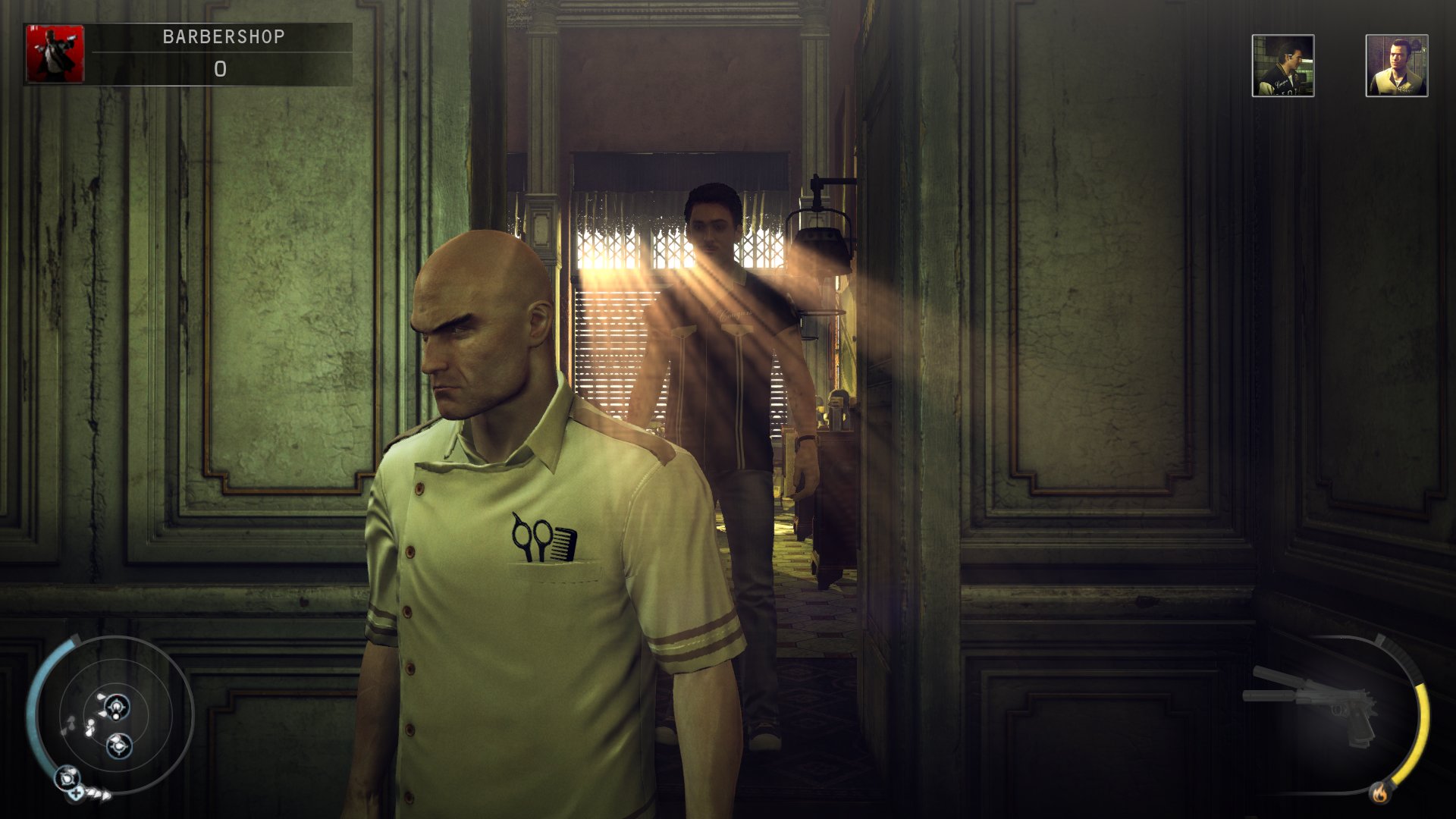
The haircuts from this Barber are to die for
Agent 47 has been asked by the Agency to kill his former handler, Diana Burnwood. Diana put her life at risk to save 47 in the excellent finale of Hitman: Blood Money. She has gone rogue and Agency man, Benjamin Travis, orders her elimination at the hands of 47. The silent assassin completes his task and a prewritten letter from Diana begs him to protect Victoria, a girl with the potential to turn into a killer. Agent 47 must protect her the only way he knows how; by process of elimination.
It’s not just the Agency who is after Victoria. Blake Dexter, a vile cowboy, sees Victoria as a valuable asset to be ransomed. With the aid of his super soldier, the gigantic Sanchez, he is unwavered by Agent 47. Dexter’s friends, soon to be victims, are many flavours of sleaze, slime and scum. It’s easy to hate these characters and the mercenaries paid to do their bidding. The story is full of memorable, despicable characters and ludicrous moments, but it does an amicable job with a protagonist who rarely speaks.
Mission preparation is virtually absent thanks to the story structure. You are rarely assigned a target, instead asked to evade police or mercenaries. There are no maps of areas, so you’ll need to explore to understand the layout. Agent 47 trades his arsenal for information, leaving him without the choice of equipment before missions. This doesn’t justify why disguises and weapons change from one level to the next. The game arbitrarily gives or takes equipment for no reason. It removes a useful disguise as you enter a different area of the same facility. This lack of preparation contributes to the number of restarts needed to achieve perfection.
There are generally two types of level structures in Absolution; evasion and assassination. Assassination missions are sandbox, exploratory and structured similar to most of the levels in Blood Money. Two of these occur in the same Chinatown level, with the second being one of the best in the game. It’s a shame most are fairly small and reuse accidents. Targets proceed on routes that take them through convenient accident spots or isolated areas. Non targets provide the necessary challenge and useful disguises. World items can poison, electrocute, burn, crush or distract. Just watching the world can reveal solutions. The game tries to dictate player actions in these sandbox areas, and this leads to rudimentary solutions.
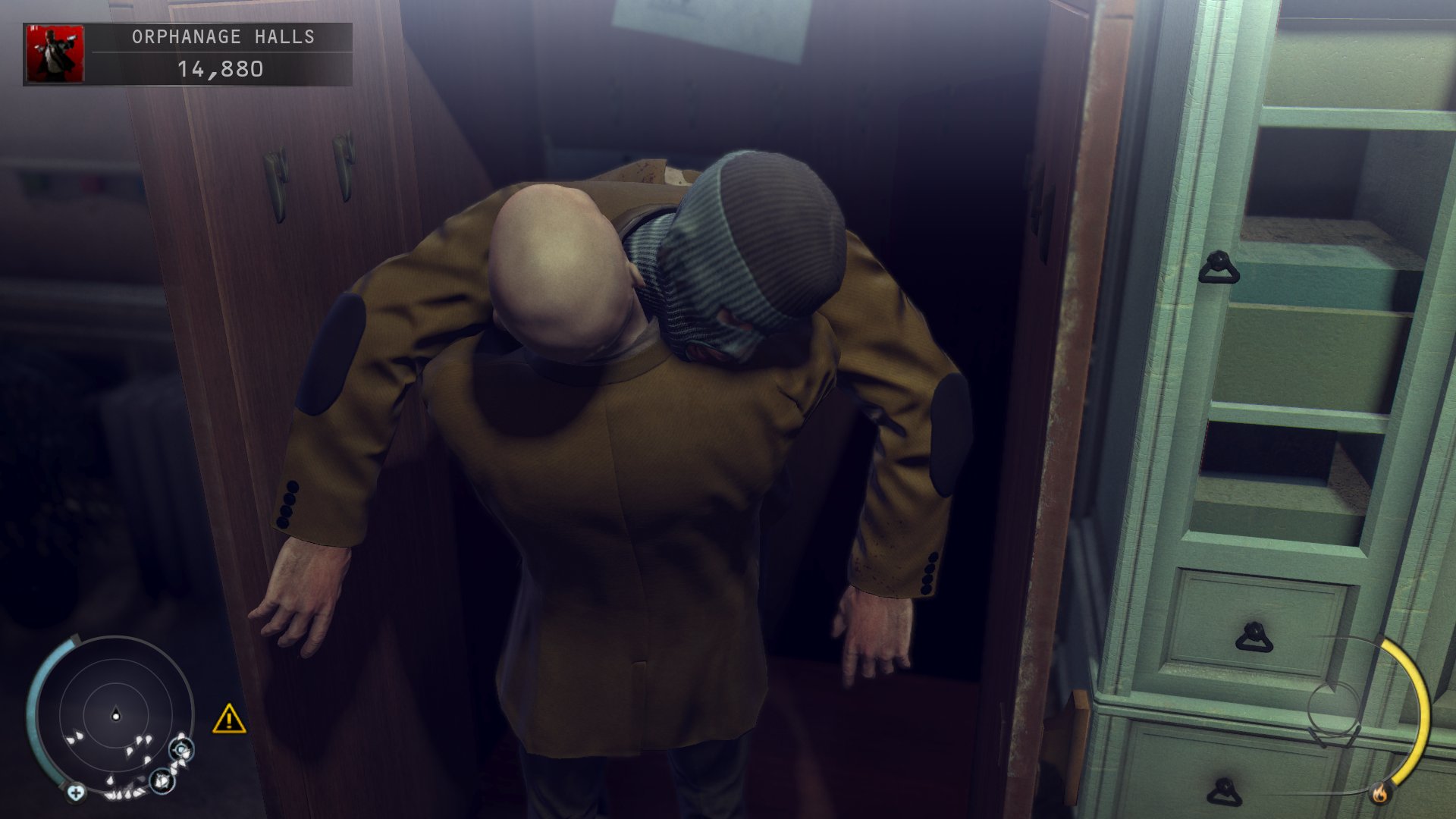
Cupboards are great for hiding bodies or yourself
Evasion levels are more linear and ask you to reach the other end of a level. They emphasize stealth over accidents or deception. They break up the freeform levels and push you forward at a more constant pace. The levels might place a sniper rifle lazily against a wall and then give you the ideal sniper nest seconds later. There is nothing wrong with these forward motion evasion levels, but Absolution has too many of them compared to sandbox assassinations. The mixture of both evasion and assassination levels, seen near the end, is preferred over straight up evasion. Swapping the relative proportions of these mission structures would have done wonders for the game.
Disguise gameplay is punishing and very different relative to its predecessor. You’ll work just as hard in a disguise as you would in stealth or combat. If you take a police disguise, all police in the area are to be avoided. Just by facing their direction, you’ll gain attention from half way across the level. It’s like putting on a shirt that says “I am the bald assassin” on the front and “only joking” on the back. You’d attract less attention by walking around in your underwear. The game wants you to turn away or use instinct to cover your face. If you are spotted for a fake, you can still recover by leading the suspicious guard to an isolated area.
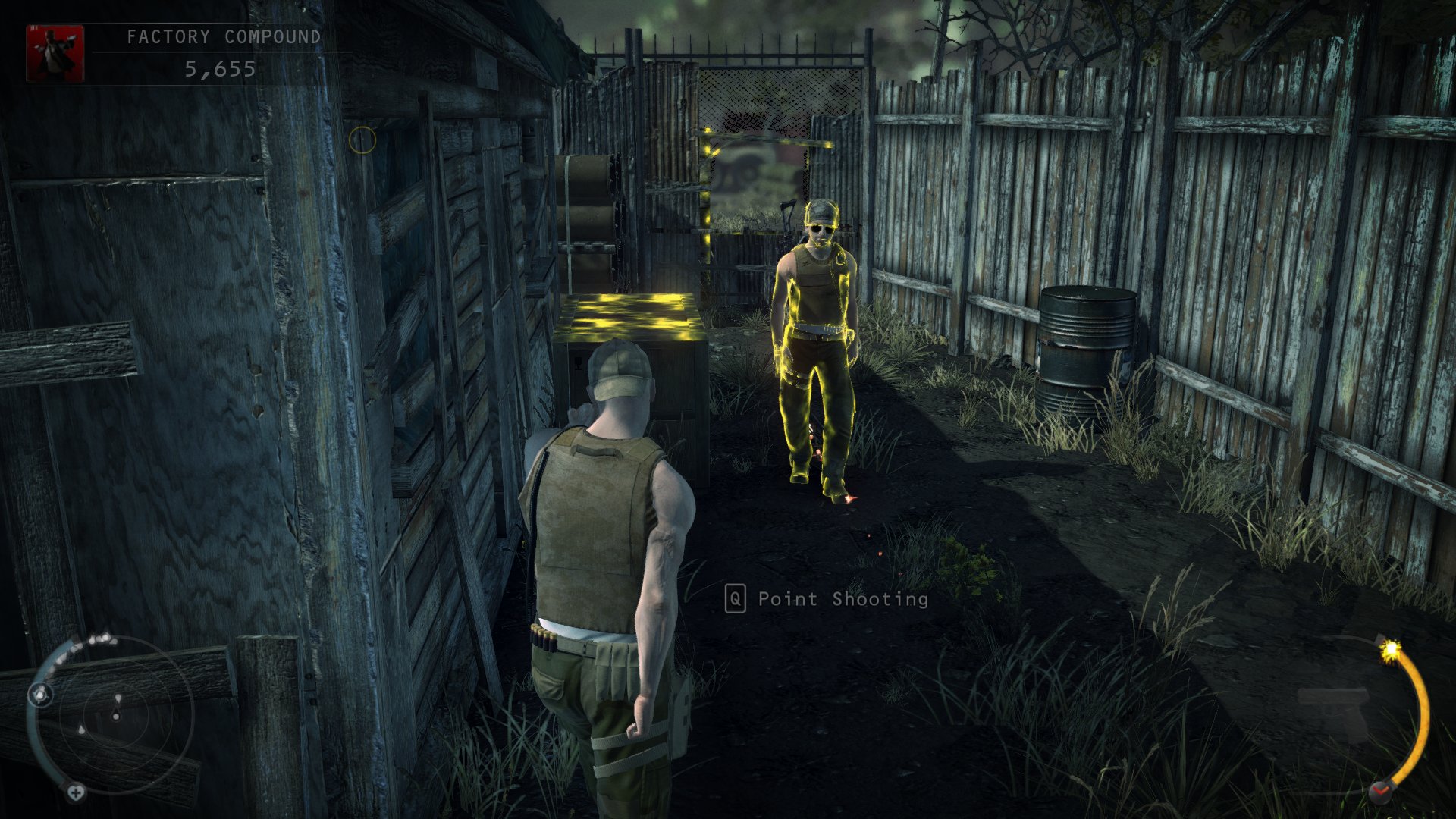
Totally not a threat because I tipped my hat in your direction!
It’s ungainly to shuffle around, facing away from enemies, and watch yellow arrows grow and shrink on your HUD. Your finger is always ready to press the instinct button when the arrows get too large. Enemy AI view range and peripheral vision is too great, especially within civilian crowds. Agent 47’s ear is very recognisable from long distances too. A cook will see through your chef outfit from 30 paces, yet a policeman is oblivious with his flashlight in your face. You can even avoid detection by turning in circles or switching corners as guards surround you. Luckily there is still satisfaction as the disguises bring you through hostile areas; it just requires a lot more effort than before.
Absolution wants you to play as a silent assassin. It wants you to get through unnoticed, kill your target and escape as a shadow. A point system compares your score to friends and the world. You’ll lose points for killing non targets or knocking them out. You can recoup points by placing bodies in specific containers like fridges. Dragging bodies to non trafficked areas should have been worth something. You lose points for passing invisible, unintelligible trespass barriers found only through trial and error. Shooting everybody in a level is an option, but you might end up with negative points for it. The points give you extremely minor, uninteresting, auto assigned upgrades. You will gravitate towards the silent approach but won’t be punished greatly for gratuitous violence.
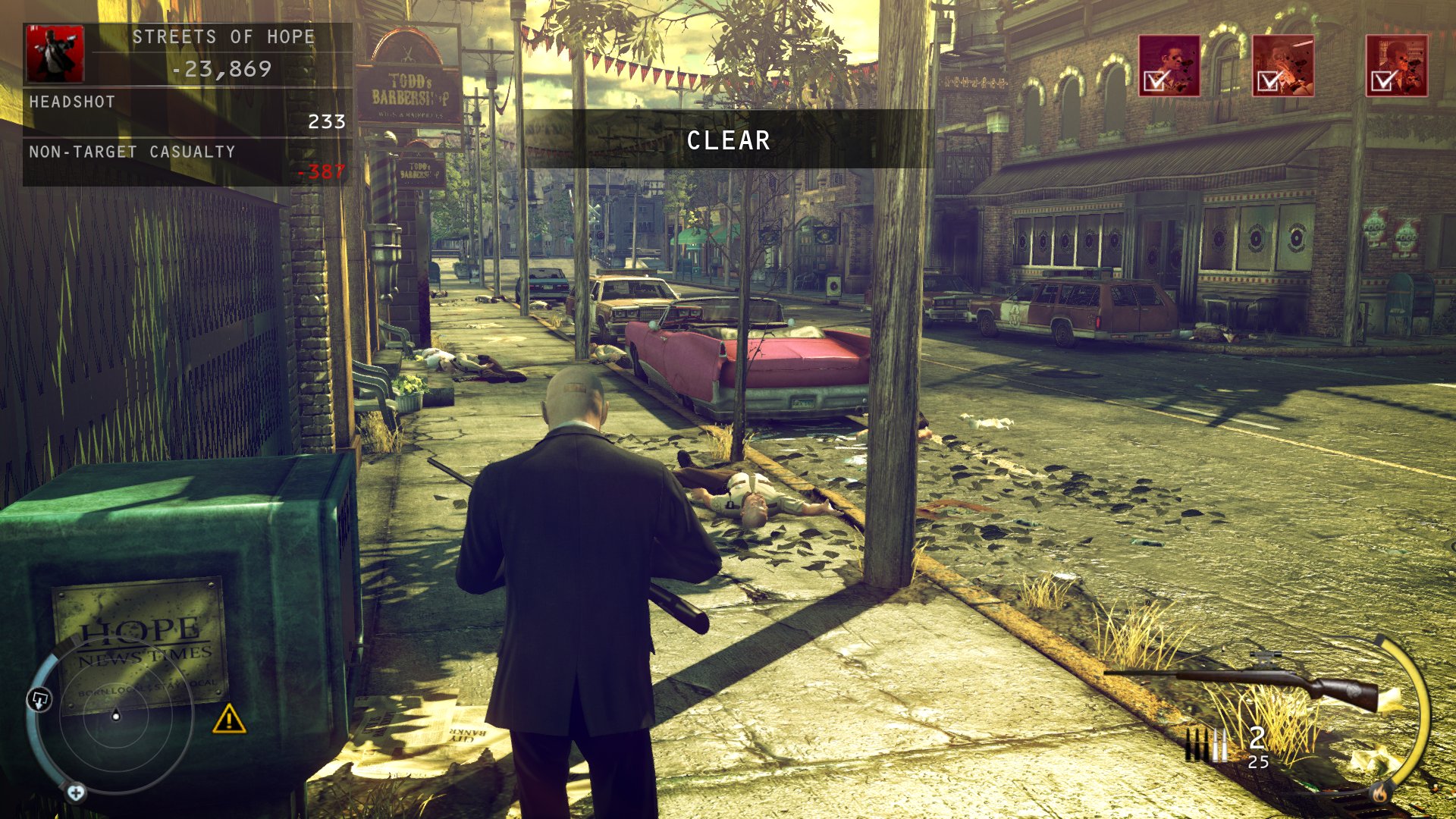
You can shoot everybody in a level, but there are massive point penalties
Enemy AI is a good component of Absolution. Their vision is tweaked so you have ample time to move between cover at range. They can be lured to an isolated area by making sounds or throwing objects. They react to dead bodies, branching to the far corners of areas when corpses are left lazily in groups. Guards even taunt you if they see you enter a hiding spot. It’s unfortunate that you’ll have to wait for conversations before guards move to their vulnerable positions. More audio clues would have been nice instead of relying so much on the HUD arrows. On the harder modes, extra guards make it extremely difficult to move through areas inconspicuously. The AI proves a worthy adversary for Agent 47 but would benefit from further tweaks.
Odd quirks and glitches limit the potential of the AI or ruin a perfectly good plan. Agent 47 was able to grab an enemy, deep in conversation, and pull her behind a desk. The remaining guard asked, “Where did you go?” and walked away. A remote explosive, placed near a leaking gas stove, killed the civilian in the floor below while leaving the occupant of the room unscathed. After killing several characters with a loud car lift, a policeman stood by and watched as it was raised and lowered ad infinitum. It was quite surprising to hear a dead man complain after he suffered a fatal Katana wound. These types of glitches will certainly turn up if you replay levels and push the boundaries.
The save system is regularly disruptive to the world’s best assassin. It’s not so much a save system as a teleport system that ignores almost everything that happened in the level. Reloading checkpoints may position you between resurrected guards. You might be stuck in a corner with an ineffective, unchangeable disguise. Weapons return to their original spots and bodies vanish. The only things preserved are your current arsenal and major targets you assassinated. It’s often easier to restart the whole level than continue from one of these teleport saves. The save system is broken and the only time it works is when it doesn’t matter what has happened in the preceding areas.
Contracts mode turns every story level into a player created sandbox with up to three targets. It allows you to take sanctioned revenge on pesky civilians or guards that caused you grief during the campaign. You can play friend or global challenges, earning extra points for haste, exploration or following set rules. These points give you money to buy or upgrade weapons that can be equipped before missions. There is a simple elegancy to this mode but it also demonstrates how many contrived accidents are designed for the story targets. Perhaps future Hitman games could let players create accidents in a freeform, natural way. Contracts mode further improves the replay value but doesn’t counter all the problems.
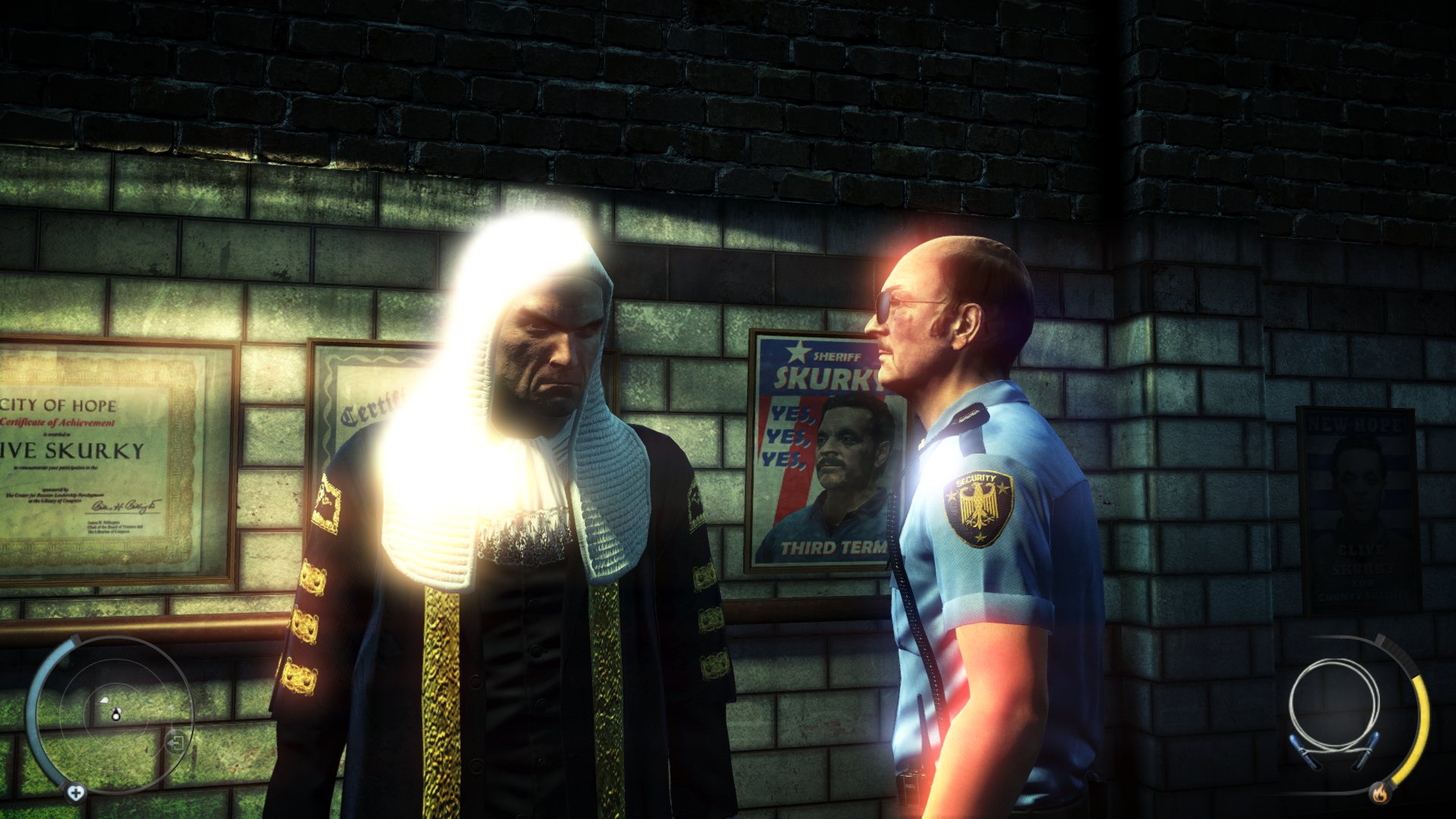
Time for a Judge Dredd quote; “I’ll be the judge of that”
Despite all the flaws, Absolution is a game that rewards replaying sections dozens of times. The search for perfection or alternative solutions drives you through missions in much the same way it did in Blood Money. Absolution needed more open sandbox assassinations and less evasion levels. Some levels are clustered together to provide unnecessary continuity. Continuity that breaks when the save system ignores events or the level transitions change your clothes or arsenal. There is still satisfaction when stealth, disguises and assassinations work. It doesn’t get much better than strangling your target and escaping undetected in a police uniform. Once you acknowledge Absolution’s sins and virtues, you will see a worthy entry in the Hitman franchise.
